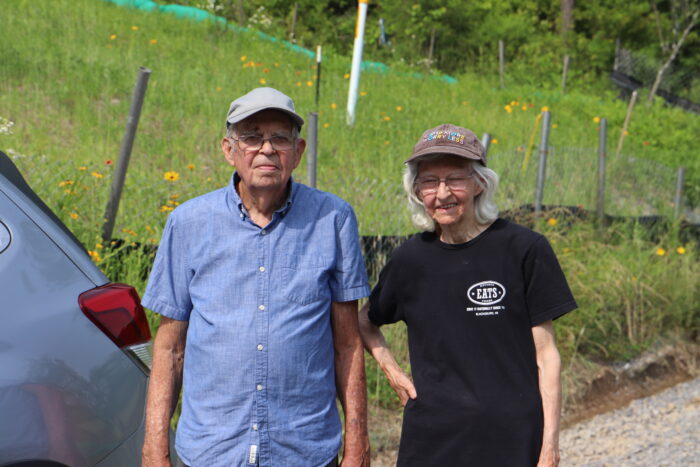Your browser doesn’t support audio playback.
Paula Mann and her husband, Herman, live in the middle of Monroe County, in far southern West Virginia.
On their sloped property, they have goats, ducks and chickens. Mann sells her chickens’ organic eggs at a farmer’s market in Blacksburg, Virginia, about an hour away.
The Manns have lived next to the Mountain Valley Pipeline since it began operating a year ago. The 303-mile high pressure gas pipeline runs from north central West Virginia and southern Virginia. It generated opposition and controversy during six years of construction and court battles.
“Well, it was pretty upsetting because we had, well, during the construction, we had people back and forth and back and forth, the trucks and everything going up and down the road,” Paula Mann said. “They tore the road all the pieces, of course, and they scared my animals to death.”
Among her lingering concerns: how the project affected their well water. Mann says their water was clean for decades before the pipeline came in.
“Our water got muddy, which it had never done before,” she said. “We never had any trouble with it until then, till after they started doing that construction, put that line in there.”
Mann says the pipeline company recently took a sample of their well water to test it. They’re awaiting the results.
The company has repeatedly stated that it followed federal regulations and that the pipeline is safe.
Residents who live near the pipeline, including the Manns, aren’t as sure.
“And one of our fears has been that, what if it blows up?” Paula Mann said.
The pipeline crosses a gravel road about a quarter mile from where the Manns live. The 42-inch diameter line passes under the road and up moderate slopes on both sides.
During the long pauses in construction as court battles played out, Mann says sections of green pipe sat exposed to the elements.
“It sat there and it faded,” she said. “We got all kinds of pictures of it, and it was rusty inside and the ends, they had ends on it, but they had fallen off. And some of them didn’t have any ends, and it was rusty in there. And of course, there’s rusty around where they have to weld them together and all that. “
Construction of the pipeline across Monroe County is now the subject of a federal whistleblower lawsuit.
Michael Barnhill is a former welding inspector on the project who lives in Texas. He claims in U.S. District Court in the Southern District of West Virginia that he was fired in late 2023 after raising safety concerns, including issues around corrosion and faulty welding.
EQT, the natural gas producer that owns the pipeline, has asked Judge David Faber to dismiss the case.
The Manns are not part of the lawsuit. Still, Paula says the years of construction upended their lives.
Some landowners got compensation for the pipeline to cross their property. Though they’ve had to live with the impacts of having the line so close to their home, the Manns received nothing.
“They paid the people where they went through their property,” Paula Mann said. “They paid them, but then the landowners adjacent got nothing, even if they messed up their water or whatever, and they messed up a lot of people’s water wells and everything, but they got no compensation from it.”
The pipeline’s builders took some landowners to court to gain access to their property through eminent domain. The courts allowed the company to take the property it needed to finish the nearly $10 billion project.
The Manns weren’t caught up in those disputes, but they’ve not had a warm relationship with the pipeline’s operator.
“They didn’t like us that good anyway, because we opposed it,” Paula Mann said.
Shawn Day, a spokesman for the pipeline, says the Manns should receive the test results for their water quality in a few weeks.
